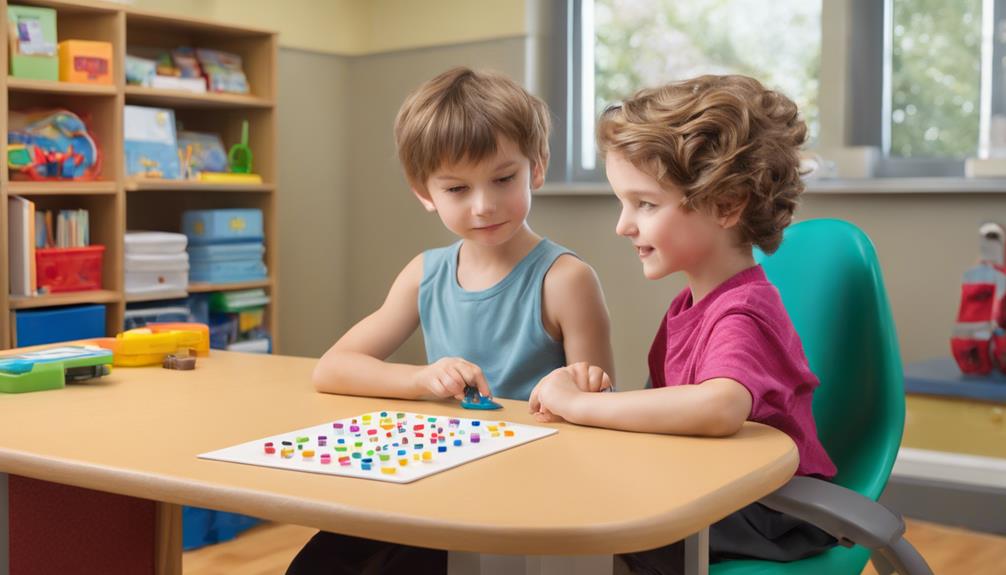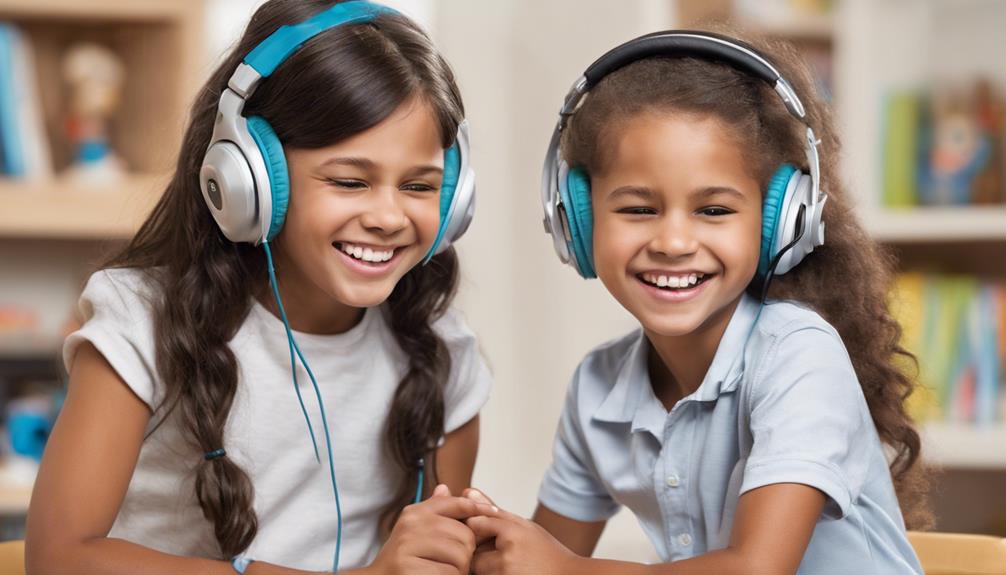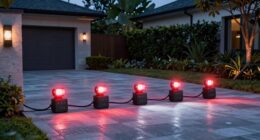As we navigate the landscape of auditory-verbal therapy for school-aged children with hearing loss, it's akin to unraveling a complex puzzle with each piece revealing a new facet of understanding.
The intricate web of influences on language acquisition and speech development in these children underscores the importance of exploring the effects of AVT.
By examining the nuanced interplay between therapy outcomes and educational performance, we can glean insights into the potential transformative impact of AVT on communication skills.
Join us as we uncover the layers of this crucial discussion, shedding light on the implications for future interventions in this domain.
Key Takeaways
- Auditory-Verbal Therapy enhances speech clarity and listening skills in school-aged children with hearing loss.
- Improved academic performance and language development are notable outcomes of AVT interventions.
- AVT fosters social interaction skills and boosts confidence in communication for children with hearing impairment.
- Educational support systems play a critical role in the success of AVT programs for school-aged children.
Theoretical Framework of Auditory-Verbal Therapy
In Auditory-Verbal Therapy (AVT), the emphasis lies on developing spoken language skills primarily through auditory input to assist children with hearing loss in achieving communication abilities comparable to their normal-hearing peers.
Early intervention plays a crucial role within the theoretical framework of AVT, aiming to optimize communication outcomes in children with hearing impairment. By focusing on spoken language skills, AVT programs strive to bridge the gap between children with hearing loss and their peers, enhancing social integration and linguistic capabilities.
Encouraging natural communication and utilizing residual hearing are fundamental aspects of the AVT approach, facilitating language development in children with hearing loss. The theoretical foundation of AVT underscores the importance of harnessing auditory input to promote language acquisition, emphasizing the potential for children with hearing loss to achieve significant milestones through dedicated intervention strategies.
Through early and targeted interventions, AVT aims to empower children with hearing loss to communicate effectively and participate fully in social and academic environments.
Benefits of Auditory-Verbal Therapy
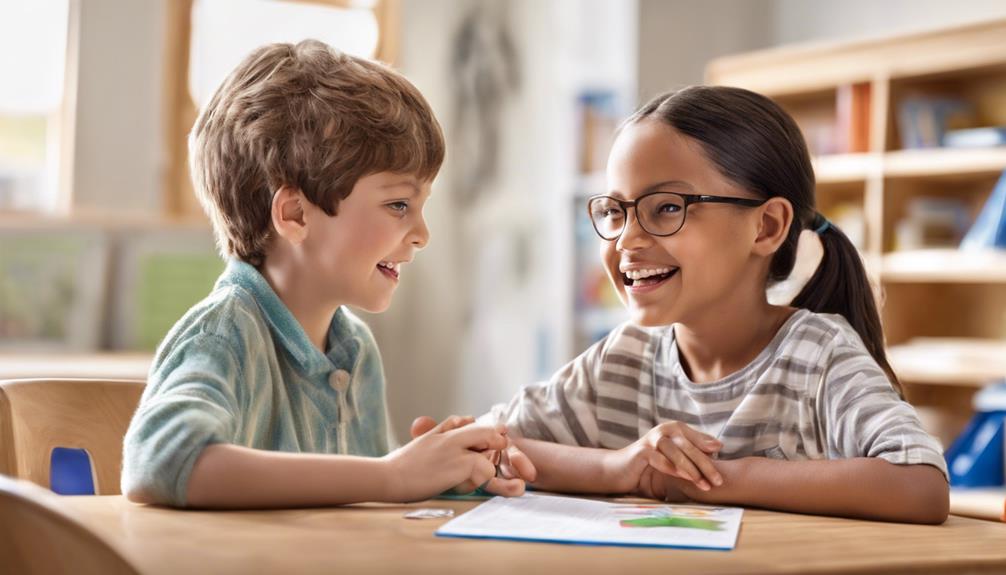
Auditory-Verbal Therapy offers significant benefits to children with hearing loss, including improved speech clarity, enhanced listening skills, and better academic performance.
These outcomes are supported by evidence showing that children undergoing this therapy demonstrate increased self-confidence in communication and better social interactions.
The individualized approach of Auditory-Verbal Therapy plays a vital role in enhancing the quality of life for children with hearing impairment.
Improved Speech Clarity
Enhancing speech clarity in school-aged children with hearing loss can be achieved through focused development of spoken language skills using residual hearing in Auditory-Verbal Therapy.
This specialized therapy targets articulation and phonological development, resulting in clearer speech production for children utilizing cochlear implants or hearing aids. Research indicates that children undergoing Auditory-Verbal Therapy experience significant reductions in phonological and articulation errors, showcasing enhanced speech clarity following therapy sessions.
By emphasizing listening and speaking abilities, this therapy facilitates improved speech perception and production outcomes in children with hearing loss.
Through its emphasis on auditory input and effective communication strategies, Auditory-Verbal Therapy plays a crucial role in enhancing speech clarity and communication skills in school-aged children with sensorineural hearing loss.
Enhanced Listening Skills
Focused on developing speech perception in children with hearing loss, Auditory-Verbal Therapy enhances listening skills through targeted interventions and strategies. Children undergoing AVT exhibit improved auditory discrimination and sound recognition, fostering better communication abilities.
By emphasizing the utilization of residual hearing, AVT aids in enhancing listening skills essential for language development and social interactions. The therapy encourages active listening and auditory processing, which are vital for academic success and effective communication.
Through honing listening skills with AVT, children with hearing loss build confidence in comprehending and responding to spoken language proficiently. This comprehensive approach not only improves listening skills but also contributes significantly to overall language development and the enhancement of social communication skills.
Better Academic Performance
Our observations reveal a notable enhancement in academic performance among school-aged children with hearing loss following participation in Auditory-Verbal Therapy (AVT), showcasing improvements in speech perception and language development.
AVT has been proven to:
- Boost academic performance by improving speech perception and language development
- Enhance reading abilities and comprehension skills
- Facilitate social interactions in educational settings
These benefits contribute to better academic outcomes for children with hearing loss. By focusing on developing spoken language skills, AVT equips these children with the tools needed to excel academically, fostering effective communication and learning in school environments.
Case Studies on Auditory-Verbal Therapy
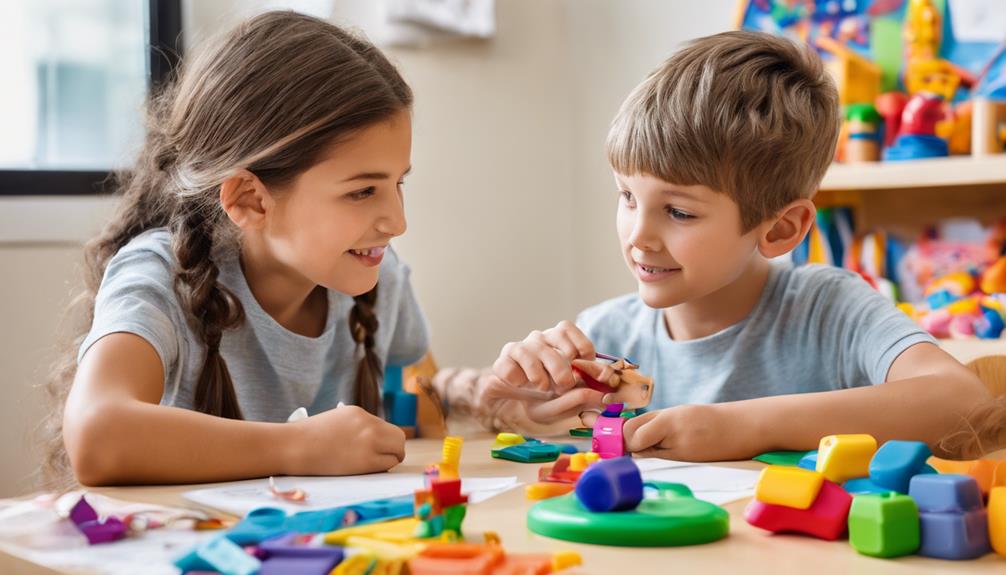
In analyzing the outcomes of auditory-verbal therapy through case studies, we observed a significant positive impact on the communication skills of school-aged children with hearing loss. These studies highlighted improvements in speech perception, production, receptive language skills, and literacy abilities following therapy sessions.
The detailed assessment of therapy outcomes in these cases provides valuable insights into the effectiveness of auditory-verbal therapy interventions for children with hearing impairment.
Therapy Outcomes Analysis
After 20 weeks of auditory-verbal therapy-based speech and language intervention, seven school-aged children with sensorineural hearing loss demonstrated significant improvements in speech perception, production, and receptive language skills. The therapy outcomes emphasized the effectiveness of auditory-verbal therapy in enhancing speech and language abilities in children with hearing loss.
Key findings include:
- Phonological error scores more than halved post-therapy
- Articulation errors significantly decreased after therapy sessions
- Reading comprehension scores improved, showing progress in literacy skills
These results highlight the positive impact of auditory-verbal therapy on speech and language outcomes, particularly in receptive and expressive language tasks. The data supports the efficacy of this intervention in fostering communication skills for children with hearing loss.
Impact on Communication Skills
Several case studies on auditory-verbal therapy in school-aged children with hearing loss have demonstrated marked improvements in speech perception, production, and receptive language skills. Through tailored interventions focusing on speech and language development, auditory-verbal therapy has shown to enhance communication skills in these children.
Experienced pathologists leading speech therapy sessions as part of auditory-verbal therapy have successfully reduced phonological and articulation errors, contributing to improved speech clarity and overall communication abilities.
Furthermore, the emphasis on intensive rehabilitation and early intervention within auditory-verbal therapy has positively impacted the children's literacy skills, as evidenced by enhanced reading comprehension scores post-therapy. These findings underscore the significant role auditory-verbal therapy plays in fostering robust communication skills in school-aged children with hearing loss.
Academic Performance and Auditory-Verbal Therapy
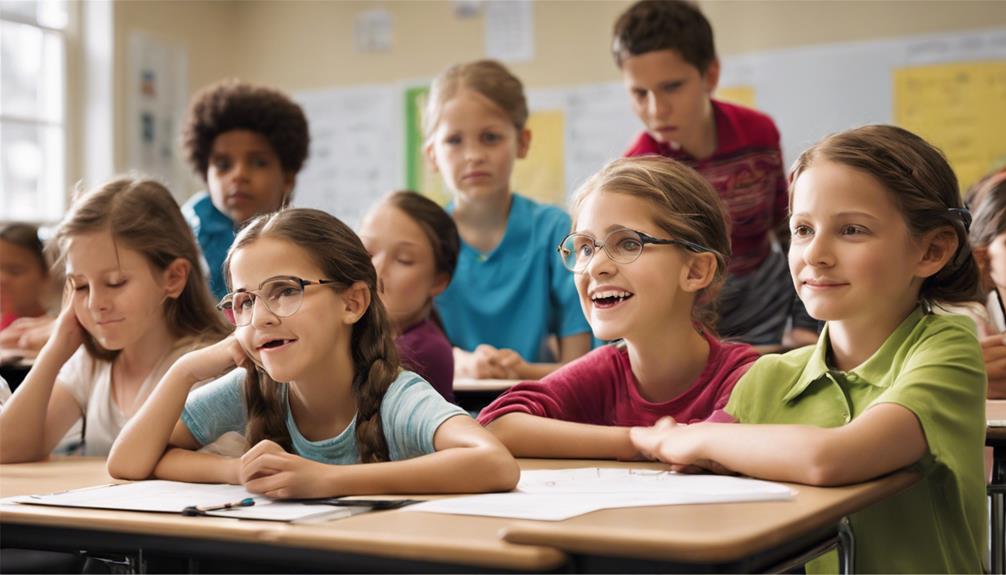
Enhancing academic performance in school-aged children with hearing loss, auditory-verbal therapy (AVT) has shown significant promise through its focus on language development and speech perception skills improvement. AVT plays a crucial role in supporting academic success in children with hearing loss by enhancing their language abilities. Here are some key points to consider:
- AVT directly impacts academic performance by improving language development, which is essential for success in school.
- Through AVT, children with hearing loss can enhance their speech perception skills, leading to better communication and learning in the classroom.
- The emphasis of AVT on developing spoken language skills contributes to overall academic progress and literacy skills.
Research indicates that children who receive AVT demonstrate better academic outcomes compared to those who don't undergo such therapy. By focusing on language development and speech perception, AVT equips children with the tools they need to excel academically despite their hearing loss.
Communication Skills Development
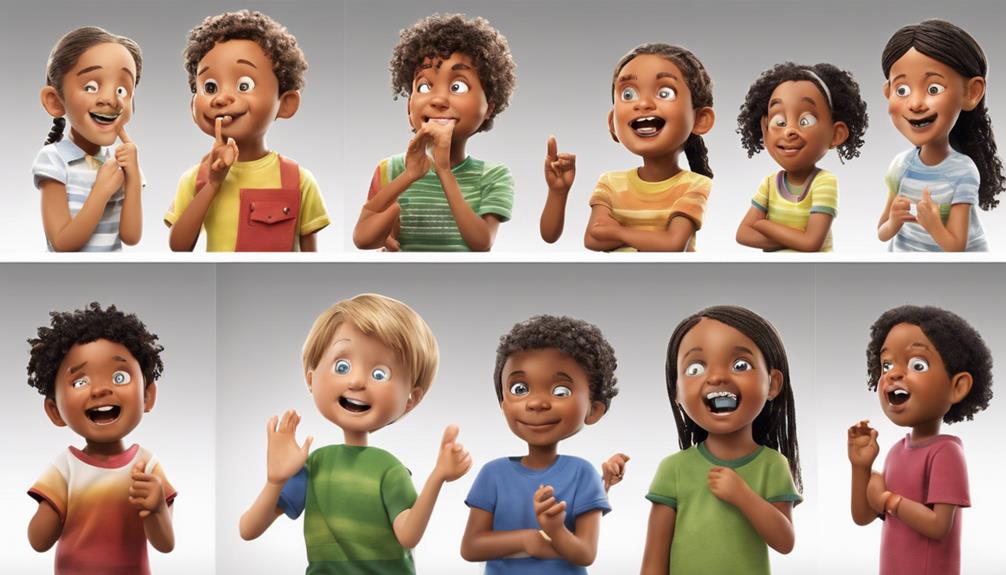
Our investigation into the effects of Auditory-Verbal Therapy (AVT) on children with hearing loss is now turning towards the critical area of Communication Skills Development.
We'll explore Language Acquisition Milestones, Social Interaction Strategies, and Educational Support Systems as key points within this domain.
Language Acquisition Milestones
Effective language acquisition milestones are crucial for children with hearing loss, as they significantly impact their communication skills development and overall progress in auditory-verbal therapy. Achieving communication milestones such as babbling, first words, and sentence formation may require targeted intervention strategies tailored to each child's needs.
Factors like age of intervention, family involvement, and type of hearing technology used can influence language acquisition milestones in children with hearing loss. Early identification of hearing loss and prompt initiation of auditory-verbal therapy play a vital role in a child's ability to reach these milestones.
Progress in communication skills development, including vocabulary expansion, grammar acquisition, and speech intelligibility, is a key focus of auditory-verbal therapy in children with hearing loss. Monitoring language milestones and adjusting therapy goals based on individual progress are essential for optimizing language development outcomes in school-aged children with hearing loss.
Social Interaction Strategies
Utilizing social interaction strategies within Auditory-Verbal Therapy (AVT) enhances the development of effective communication skills in children with hearing loss. These strategies focus on teaching children how to engage in conversations, interpret social cues, and actively participate in social settings.
By emphasizing natural communication exchanges, AVT helps children with hearing impairment build confidence in social situations. Through AVT, children learn to understand and respond to verbal communication, ultimately equipping them with the necessary skills to engage with peers and navigate various social environments effectively.
Educational Support Systems
Educational support systems play a crucial role in fostering the development of communication skills in children with hearing loss through tailored interventions and specialized educational approaches. Auditory-Verbal Therapy (AVT) is particularly effective in promoting language development and enhancing communication skills in school-aged children with hearing loss.
Key aspects of educational support systems include:
- Providing individualized AVT interventions to enhance speech perception and language skills.
- Fostering independence in communication by utilizing residual hearing and boosting self-confidence.
- Promoting social interactions and integration into mainstream educational settings.
These tailored approaches aim to improve overall quality of life and academic performance for children with hearing loss, highlighting the significance of specialized educational support systems in facilitating their communication development.
Auditory-Verbal Therapy Techniques
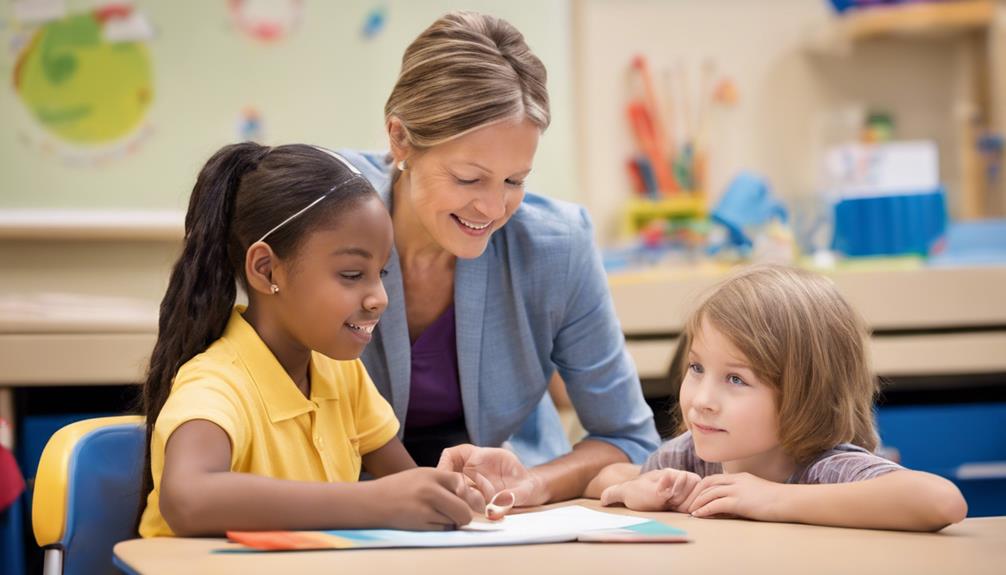
In Auditory-Verbal Therapy (AVT), the primary focus lies on fostering spoken language skills through maximizing auditory input and promoting natural communication interactions. AVT techniques are designed to optimize language development in children with hearing loss by utilizing residual hearing effectively. These techniques integrate intensive listening practice into daily activities, enhancing speech perception and language acquisition. By encouraging natural communication interactions, AVT aims to empower children with hearing loss to express themselves verbally and develop independence in their verbal skills.
| AVT Technique | Description | Benefit |
|---|---|---|
| Auditory bombardment | Exposing the child to a high volume of targeted auditory stimuli to improve speech perception skills | Enhances speech perception and discrimination |
| Auditory verbal modeling | Demonstrating correct pronunciation and language structure for the child to imitate | Improves speech production and language accuracy |
| Language-rich environment | Creating environments filled with language stimuli such as books, music, and conversations | Facilitates language learning and vocabulary expansion |
| Auditory verbal feedback loop | Providing immediate feedback on the child's speech to promote self-monitoring and correction of articulation | Enhances articulation skills and phonological development |
These strategies collectively work to advance spoken language skills and overall communication abilities in children undergoing Auditory-Verbal Therapy.
Parental Involvement in Therapy
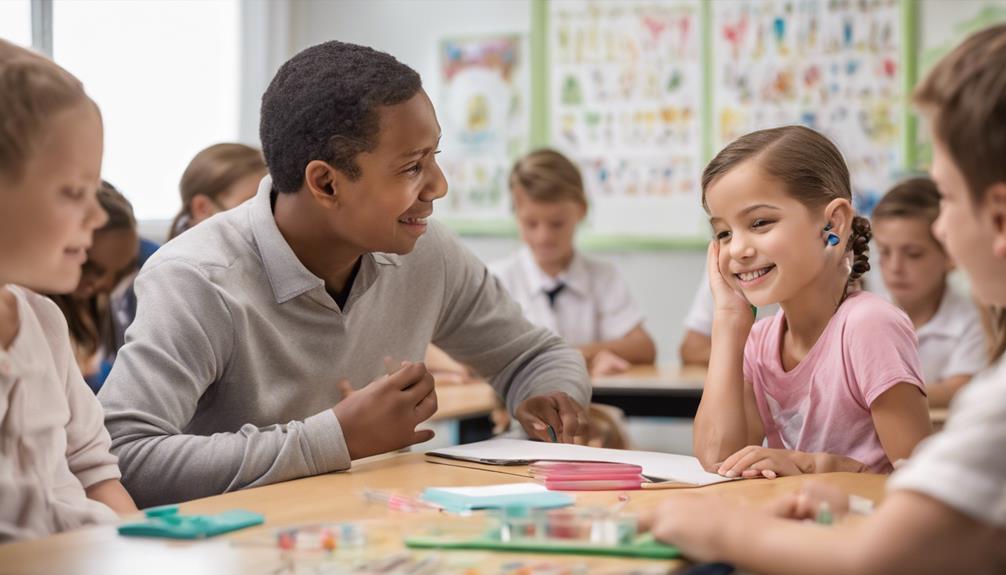
Active participation by parents in auditory-verbal therapy (AVT) plays a pivotal role in enhancing language outcomes and communication skills for children with hearing loss. Parents' involvement is key to reinforcing therapy goals and strategies at home, ensuring continuous progress and success. Studies indicate that when parents actively participate in AVT sessions, children demonstrate improved language development and communication abilities. This collaborative approach between parents and therapists fosters a strong foundation for effective communication and language acquisition in children with hearing loss.
Key Points:
- Reinforcing Therapy Goals: Parents play a crucial role in reinforcing therapy goals and strategies at home.
- Improved Language Development: Active parental involvement in AVT sessions leads to better language outcomes and enhanced communication skills.
- Continuous Progress: Parents are often trained to support their child's listening and spoken language development outside of therapy sessions, promoting continuous progress.
Long-Term Effects of Therapy
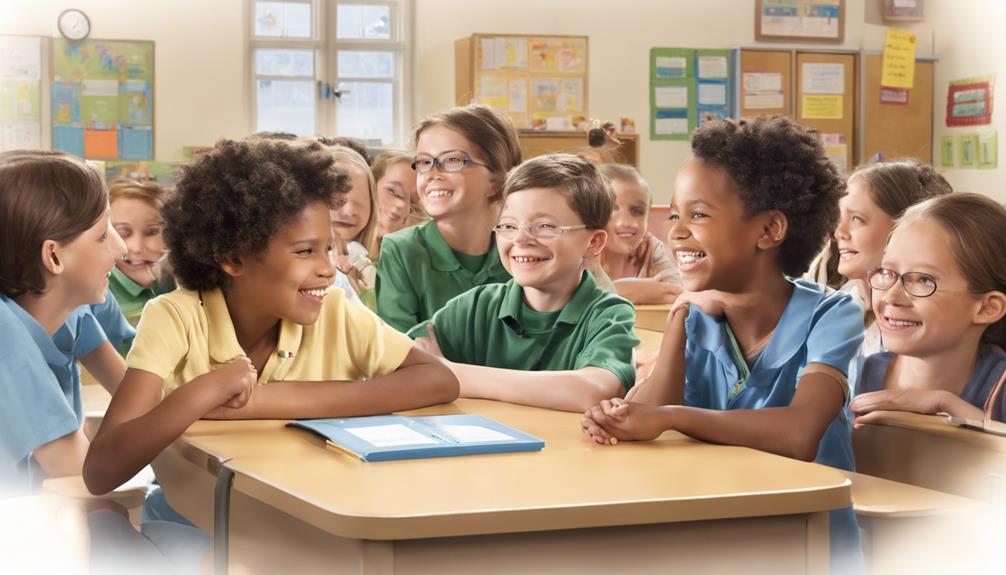
Sustaining improvements in speech perception and production skills is a notable outcome observed in school-aged children with hearing loss who engage in long-term auditory-verbal therapy. Continued therapy contributes to enhanced receptive language abilities, leading to improved communication outcomes in daily life.
Children receiving ongoing auditory-verbal therapy show maintenance of gains in phonological development and articulation. Post-therapy, lasting benefits in speech and language outcomes support the effectiveness of auditory-verbal interventions in the long term.
Additionally, ongoing support and follow-up sessions help solidify gains in reading comprehension and literacy skills achieved through auditory-verbal therapy in children with hearing loss. These findings highlight the importance of consistent therapy in school-aged children with hearing loss, showcasing the positive impact of auditory-verbal therapy on their speech, language, and overall communication skills over time.
Challenges and Limitations
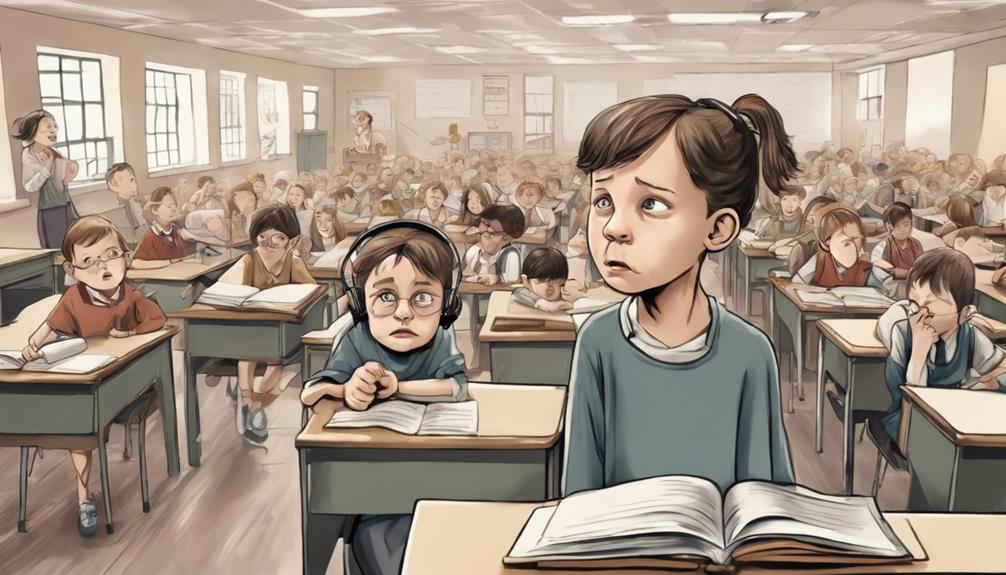
Amid the landscape of interventions for school-aged children with hearing loss, challenges and limitations surrounding auditory-verbal therapy come to the forefront. When considering the implementation of auditory-verbal therapy for school-aged children with hearing loss, several challenges emerge:
- Limited Availability of Certified Therapists: The scarcity of certified therapists specialized in auditory-verbal therapy can hinder the accessibility of services for children with hearing loss.
- Financial Constraints: Some families may face financial barriers that impede their ability to seek auditory-verbal therapy for their children with hearing loss.
- Cultural and Linguistic Barriers: Cultural and linguistic differences can impact the effectiveness of auditory-verbal therapy interventions for school-aged children with hearing loss.
Addressing these challenges is crucial to ensure that school-aged children with hearing loss have equal opportunities to benefit from auditory-verbal therapy. By recognizing and overcoming these obstacles, we can strive to provide more inclusive and effective interventions for children in need.
Future Research Directions
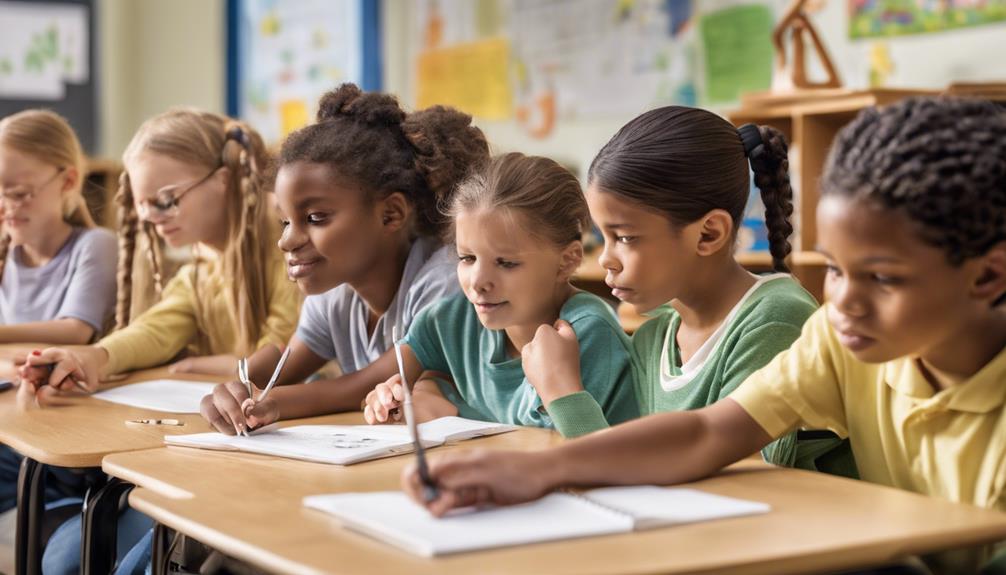
Exploring avenues for future research, the effectiveness of Auditory-Verbal Therapy (AVT) interventions in children with hearing loss warrants a comprehensive evaluation through controlled studies employing a broader array of assessment tools. It's essential to focus on measuring improvements in speech, language, reading, and speech perception following intensive Speech and Language Therapy (SLT) interventions to gauge the impact of AVT accurately.
Additionally, continued exploration of AVT's effects on literacy development in children with hearing loss is crucial for enhancing our understanding of its impact on speech and language outcomes. Research efforts should also investigate the influence of AVT on different age groups and diverse populations to gain valuable insights into its effectiveness and applicability across varying demographics.
Furthermore, incorporating technology for enhanced learning experiences and collaborating with educators for better integration can significantly advance the outcomes and accessibility of Auditory-Verbal Therapy for children with hearing loss. By prioritizing controlled studies, expanding assessment tools, and emphasizing the measurement of various outcomes, future research can contribute significantly to refining and optimizing AVT interventions for the betterment of children with hearing loss.
Frequently Asked Questions
What Are the Effects of Auditory Verbal Therapy for School Aged Children With Hearing Loss an Exploratory Study?
We found that auditory-verbal therapy significantly improved speech perception, production, and receptive language in school-aged children with hearing loss.
Our study integrated AVT principles such as baseline audiometric evaluations and a family-centered approach. Goals included enhancing syntax, vocabulary, and literacy skills.
Post-therapy, we observed reduced phonological and articulation errors, indicating progress in phonology and speech production. Reading comprehension scores also improved, showcasing advancements in reading abilities for these children.
What Is Auditory Verbal Therapy for Children With Hearing Loss?
Auditory Verbal Therapy is a method that focuses on developing spoken language skills in children with hearing loss by utilizing hearing as the primary mode of communication.
This therapy emphasizes listening and speaking abilities to enhance communication in everyday situations.
Through the promotion of natural interactions and the use of residual hearing, AVT aims to improve speech perception, language skills, and social interactions in children with hearing loss, ultimately fostering independence in communication.
What Are the Outcomes of Auditory Training Therapy With Children With Hearing Loss?
We've seen remarkable improvements in speech perception, production, and language skills in children with hearing loss post-auditory training therapy. Phonological error rates decreased significantly, showing substantial progress in phonology.
Articulation errors also notably reduced, enhancing speech clarity. Reading comprehension scores improved, indicating advancements in literacy skills.
The therapy targeted language goals, phonological development, vocabulary enrichment, and articulation enhancement, benefiting overall language development in children with hearing loss.
How Effective Is Auditory Verbal Therapy?
We find Auditory-Verbal Therapy (AVT) highly effective in enhancing speech perception, language skills, and academic performance in children with hearing loss.
Research indicates significant improvements in communication abilities, especially in noisy environments.
AVT focuses on promoting age-appropriate language development for successful integration into mainstream society.
Future studies aim to provide robust evidence of AVT's effectiveness through well-controlled designs and broader inclusion criteria.
Conclusion
In conclusion, the study underscores the transformative impact of Auditory-Verbal Therapy on school-aged children with hearing loss. Through integrating auditory input and daily practice, significant improvements in speech and language outcomes were observed.
Like a melody weaving through the silence, AVT harmoniously enhances communication skills and fosters language development in children with hearing impairment.
These findings emphasize the vital role of AVT in empowering children to thrive in their communication abilities and academic performance.

